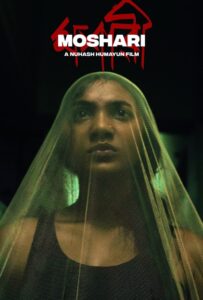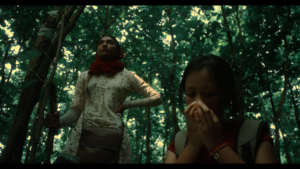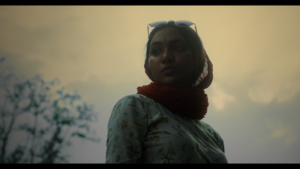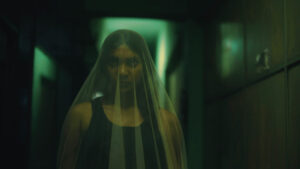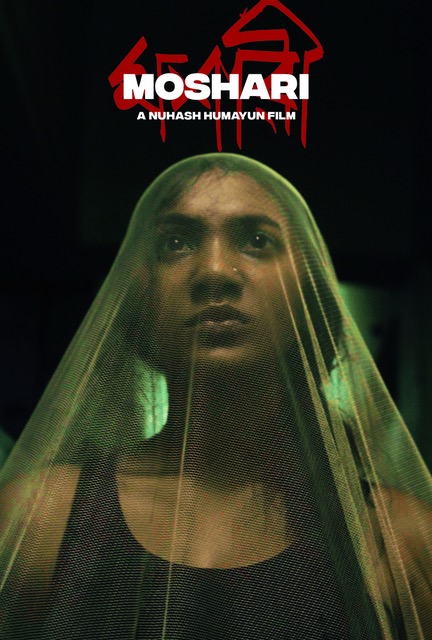
Oscar Qualifying Short Film Review “Moshari”
WATCH THE TRAILER HERE
WATCH THE FILM HERE
First, the Recap:
We’ve heard it before–it’s the end of the world as we know it. But, if confronted with that reality, are we TRULY feeling fine about it? It’s a concept we might not actually wish to face, with more than enough perspectives presented about what it would be like and in what form it would occur to become the stuff of recurring nightmares. Apu (Sunerah Binte Kamal) and her younger sister Ayra (Nairah Onora Saif) now live such an actuality daily in their home country of Bangladesh, only venturing about in daylight to forge for what they can find and enjoy some semblance of what’s left of the outside world before being forced to retreat under the cover of mosquito nets to sleep as night arrives–for that’s when they come out. Will these two survivors be able to withstand the onslaught of–each other–in the middle of the world’s fate?
Next, my Mind:
Third world politics, prejudices, vulnerability to assumptions, and virtual absence of liability in our world’s ever-growing issues with climate change and its equally expanding impact collide with notions of sibling bonds and bickering, love and loss, existence-ending pestilence, and preternatural fears through this thoroughly original and dynamically unsettling 22-minute Oscar-qualifying short film from writer/director/producer/editor Nuhash Humayun, producer Bushra Afreen, and executive producers Abrar Jahin Rafee and Rashad Wajahat. It is more than immediately evident why this project is under nomination consideration for the 95th Academy Awards as the level of excellence in storytelling and myriad of topics the effort chooses to explore are so beautifully executed and combined to form a greater whole that speaks volumes to so many misconceptions there are about South Asian society and those who reside in it, even as they are the ones often feeling the greatest weight of climate change and other global pressures.
Told from the viewpoint of two sisters striving to make it day to day in a newly developing, post-apocalyptic actuality that sees not just a juxtaposition of the superpower’s perceived or enforced dominance having been shattered but the frequently maligned, impoverished nations discovering the means to carry on successfully, the narrative soars along with perfect pacing, intensity, and evocative purpose, illustrating both literal and metaphorical portraits of propaganda, poverty, and disease while then infusing a legendary myth into the mix in an absolutely awesome, undeniably frightening manner that creates a fantastically unique, unnerving, eerie, and menacing atmosphere which only escalates as the tale unfolds. Feeling trapped or having a sense of isolation, doubts, and anxieties get their fair share of screen time, while we are also a party to thematic forays into the deep, sacrificial love of family, even if and when we sometimes “suffocate” and or annoy each other. Suffice it to say, after all we witness, the film’s FINALE is just plain SPECTACULAR!! Watch the film, folks.
What very much aids in the narrative being able to carry such a bold, ominous, and yet strangely hopeful, socially relevant, fully entertaining aura are the expertly crafted visuals that allow everything to start out with uncomplicated presentation but then boldly immerse and sweep you away into a decidedly creepy place where the unfaltering build-up of events gets highlighted masterfully so as to maintain the aforementioned ambiance of foreboding disquiet, imagery never revealing more than it should until the appropriate times when said revelations are definitively impactful. For this critic, especially in this age of a world-wide pandemic that is COVID-19, even the alluding to things that are, effectively, “out for (or IN) our blood” is addressed deftly and potently. It all certainly makes a play on the concepts of countries that “sucked” each other dry but now pay the price for their folly while those always looked down upon live. It still feels like we’re just scratching the surface of the objectives and messages resonating under the core premises displayed here.
Kamal exudes highly apropos and intermixed levels of both understated authority and impassioned but transparent vulnerability through her role as Apu, the older of two sisters whose desperation to adapt to their post-apocalyptic realm of existence has been anything but smooth, albeit successful. Apu’s evident and abiding affection for her younger sibling Arya causes her to be overtly firm for the sake of keeping them both safe, even when the two butt heads constantly. Apu’s steadfast insistence on them following the rules of their new life strictly, emphasizing the protection that’s needed against the monsters being faced, is believable as is her actions taken when everything gets drastically upended. It’s a wonderfully executed performance that isn’t overacted but filled with the volatility the character’s circumstances call for, and Kamal navigates this with adept skill.
What I always say, and still another time shall “speak” it again, is my persistent awe at the child actors who are out there and able to pull off roles that, while outwardly are geared towards their age, carry a far more mature air to them that is acted out with such age-defying finesse. Not an exaggeration to state this, Saif brings about a depiction of childhood innocence forced to grow up and encounter the scary truths about the world in which she resides via her portrayal of Arya, the precocious younger half of the sister duo struggling to remain alive as the end of the current world has come about and a newer, darker one has manifested. Questioning everything and stubbornly contradicting her sister’s guidance yet still following it in the end, Arya still sees light amidst the fearful elements they must face. Seeking to understand it all as she sees fit, it leads to a spine-chilling experience that will not only test her own fortitude, but the commitment her sister truly has for her. It’s a subtle, surprisingly emotional, admirably befitting performance that Saif delivers.
The primary supporting turn arrived via Moyed Bhuiyan, and let’s just leave it at the foundational declaration that he plays a pivotal role here that you need to watch the film to fully applaud and appreciate. An additional appearance via voice only is made by Pritom Hasan. So, in total, with its astute overall execution, culturally, individually, and socially provocative statements (both blatant and underlying), and a wholly clever amalgamation of drama and horror, PLUS being the FIRST Oscar qualifier in Bangladesh’s history, “Moshari” stands as a clearly worthy entry amongst the films up for consideration and one hopes at minimum it will have its chance to reach larger audiences one way or the other in order to be another example of just how powerful and extraordinary the medium of short film is. Plus, bet you’ll never look at a mosquito net quite the same way again.
As always, this is all for your consideration and comment. Until next time, thank you for reading!
